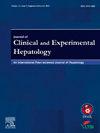困难情况下的肝移植。
IF 3.2
Q2 GASTROENTEROLOGY & HEPATOLOGY
Journal of Clinical and Experimental Hepatology
Pub Date : 2024-11-28
DOI:10.1016/j.jceh.2024.102461
引用次数: 0
摘要
受体肝切除术被认为是肝移植手术中最困难的部分。本文介绍了处理大量尾状叶,经颈静脉肝内门体分流术(TIPS)原位分流术的受体,肝细胞癌,急性肝衰竭和既往腹部手术史的受体的技术。本文章由计算机程序翻译,如有差异,请以英文原文为准。
Liver Explantation in Difficult Scenarios
Recipient hepatectomy is considered as the most difficult part of a liver transplant operation. This article describes techniques to deal with scenarios like massive caudate lobe, a recipient with a transjugular intrahepatic portosystemic shunt (TIPS) shunt in situ, a recipient with hepatocellular carcinoma, acute liver failure and a history of previous abdominal surgery.
求助全文
通过发布文献求助,成功后即可免费获取论文全文。
去求助
来源期刊

Journal of Clinical and Experimental Hepatology
GASTROENTEROLOGY & HEPATOLOGY-
CiteScore
4.90
自引率
16.70%
发文量
537
审稿时长
64 days
 求助内容:
求助内容: 应助结果提醒方式:
应助结果提醒方式:


